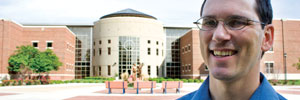
For Professor Jamey Findling, it’s all about the ‘big ideas’
Jamey Findling likes to think about the “big ideas.” Ideas like the nature of existence. Or how the process of interpretation affects our understanding. Or the role presuppositions play in acquiring knowledge.
It was that kind of thinking that led Findling away from a career in engineering to one in philosophy and education, where he could not only explore such ideas, he could make a living at it.
“I’ve always been interested in ideas, and I like bringing people together to discusvs them,” said Findling, associate professor of philosophy and director of the Gerber Institute for Catholic Studies. “I think there’s a real need for that in society.”
Findling was born in Louisville, Ky., and raised in neighboring Floyds Knobs, Ind. He made good grades in high school math and science, and went to Rice University with the idea of doing “something” in engineering. He soon learned that, “college math and science are hard. And, I never liked doing lab work.”
What he did like was a philosophy class – so much so that he stayed up nights with classmates discussing course topics. During his sophomore and junior years he took more philosophy courses, and spent his senior year studying the discipline in Germany. After receiving his bachelor’s degree in philosophy from Rice, he earned a master’s and doctorate in philosophy, both from Villanova University.
From Socrates to Gadamer
Findling came to Wichita and Newman in 2003 with his wife Jenny. The Findlings now have two sons, Charley, 4, and Emerson, 7 months. Findling’s areas of specialization are ancient philosophy – the works of Socrates, Plato and others – and modern hermeneutics – the exploration of how our interpretation of everything from a blade of grass to our concept of God is affected by presuppositions, cultural beliefs, personal experience, and many other things.
Findling has done extensive research on German philosopher Hans-Georg Gadamer, a proponent of this view, and has published many papers, including his dissertation, related to Gadamer’s work.
Since coming to Newman, Findling and his colleague, Associate Professor of Philosophy Christopher Fox, Ph.D., co-established a philosophy major (it was previously offered only as a minor). Findling has also played a key role in several university initiatives, including chairing a task force that created the Newman Code,* and leading a committee to define Newman’s Core Values, a two-year process that involved people from across the university.
Catholic thought and practice
In 2007, Findling was also part of a group asked to examine how the Gerber Institute for Catholic Studies might be revitalized. The institute, founded in 1995, had sponsored an endowed chair for visiting professors, and hosted lectures and other public discourse on Catholic thought and practice. It recent years, however, it had become inactive.
To re-establish the institute in keeping with its original mission, the group decided to present visiting speakers, conferences and other activities for the community that focused on an annual theme. Again, Findling was asked to lead the project, and was later named the institute’s director.
For 2009, the institute has explored the theme of “reconciliation,” beginning in March with a lecture by theology professor and peacebuilding expert Father Robert Schreiter. A Nov. 5 reading by award-winning writer Ron Hansen is also scheduled.
Although Findling feels the Gerber Institute is just getting underway, he has big aspirations for its future. But then, what would you expect from a man who likes the big ideas?
“I’d like for the institute to be recognized within Wichita, the diocese and the region as the place where great speakers bring insights into Catholic principles and ideas that go beyond the standard, expected rhetoric,” he said. “I’d like this to be a place where creative things happen, where we see glimpses of new solutions to old problems.”
Tags: Catholic Diocese of Wichita, Christopher Fox, Core Values, Floyds Knobs, Gerber Institute for Catholic Studies, Germany, God, Hans-Georg Gadamer, Indiana, Jamey Findling, Kentucky, Louisville, Newman Code, Plato, Rice University, Robert Schreiter, Ron Hansen, Socrates, Villanova University
